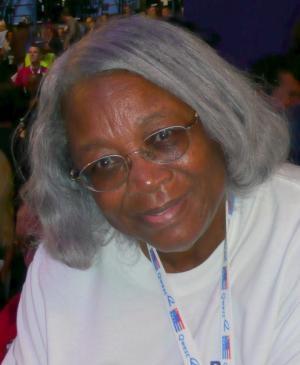Lessons in Leadership: The Honorable Yvonne B. Miller

Hon. Yvonne B. Miller was the first African American woman elected to the Virginia state legislature. She was first African American woman elected to the Virginia House of Delegates (1983) and the State Senate (1987).
Students will analyze the life of Hon. Yvonne B. Miller, her accomplishments, and leadership attributes, so they can apply persuasive techniques to amplify her accomplishments, leadership attributes, as well as those in leadership roles in their community.
Students will analyze and assess qualities of leadership, apply persuasive techniques to create a poster, and apply elements of inquiry-based learning to learn about the inspiring life of The Honorable Yvonne B. Miller. Students will demonstrate what they've learned if they are able when they are able to persuade others to support Hon. Yvonne B. Miller through a persuasive (fictitious) campaign product.
Guiding Question: What does it take to be a leader?
Supporting Questions:
-
What does it mean to break barriers?
-
What does it mean to lead?
30-45 minutes
- Have students research African American elected officials in their state. Have them identify the year they were elected.
- Have students explore socio-economic issues faced by African Americans from the 1930’s - 1980’s.
- Encourage students to identify someone who embodies the attributes of a leader. Ask them to identify what makes them a leader.
Students should have a basic knowledge of how people are elected to government and a basic understanding of the structure of the U.S. government.
Students should be familiar with the following terms: racial justice, civic responsibility, socio-economics.
Resources:
- Library of Virginia Changemakers article
- “The First Black Woman Elected to Virginia’s House & Senate was HBCU Educated and a member of Zeta!” Virginia Black Lifestyle Magazine
- Interview with Yvonne B. Miller, Library of Virginia
- Yvonne B. Miller, Virginia House of Delegates History
Materials:
- Markers
- Poster paper
- Journals or blank paper
- PowerPoint Slides
Preparation:
Teacher should collect and distribute enough poster paper, markers, and (if desired) printed articles for each group of students. Teacher should also load the Google Slide deck on a central computer or share link so all the students can access the Slide deck on their own computers.
Quick Write Warm Up:
- Teacher should ask the students “what does it mean to break barriers?”
- Give students three minutes to respond to the Quick Write in their journals.
- Have students complete a think-pair-share with a partner.
Lesson:
Have students view the oral history video, and write down answers to the following questions:
- How did Hon. Yvonne B. Miller “break barriers?”
- Develop three adjectives to describe her leadership.
- Cite examples of racial justice, civic responsibility, and socio-economic issues mentioned in the video.
Have students work in a small group to create a campaign poster* in support of Mrs. Yvonne B. Miller, encouraging voters to vote for her using the following steps:
- Share your notes from the oral history video with your small group.
- Use information from your notes to create the poster and develop a campaign slogan.
- Create the poster:
- Identify and state the top three issues on her campaign platform.
- Develop an action you would take in response to seeing the poster. Write it down.
- Determine information to share about Mrs. Yvonne B. Miller so voters know who she is and why she is important.
- Highlight her “firsts” and reasons why she is notable.
- Share your poster with the class. During this share out, each group should explain their poster, their slogan, and their decisions on what information to share about Miller. Students should explain why they made these decisions in their share out.
- If desired, the teacher can then display the posters in the classroom.
*Your poster may be created digitally or created using a poster board and markers.
The following questions should be addressed in small group discussions of students from multiple poster groups. If the class is small enough, the discussion can happen with the whole class. Students should be reflecting on their and their classmates’ posters as they discuss the following:
- How did the Honorable Yvonne B. Miller “break barriers?”
- What did you learn about leadership from this lesson?
- Share about a “first” achieved by someone you know, and/or a first you aspire to achieve.
Extension Activities:
- Create a podcast episode about the Honorable Yvonne B. Miller. Make comparisons between her leadership characteristics and those of a local politician in your community.
- Write an op-ed for a local paper, sharing what you learned about the Honorable Yvonne B. Miller, and what the readership could learn from her life.
- Create a display in your school that celebrates the life of the Honorable Yvonne B. Miller or another changemaker and highlight how her leadership is exuded in leaders in your community.
D2.Civ.7.6-8. Apply civic virtues and democratic principles in school and community settings.
D2.Civ.10.6-8. Explain the relevance of personal interests and perspectives, civic virtues, and democratic principles when people address issues and problems in government and civil society.
D2.Civ.11.6-8. Differentiate among procedures for making decisions in the classroom, school, civil society, and local, state, and national government in terms of how civic purposes are intended.
D2.His.3.6-8. Use questions generated about individuals and groups to analyze why they, and the developments they shaped, are seen as historically significant.
